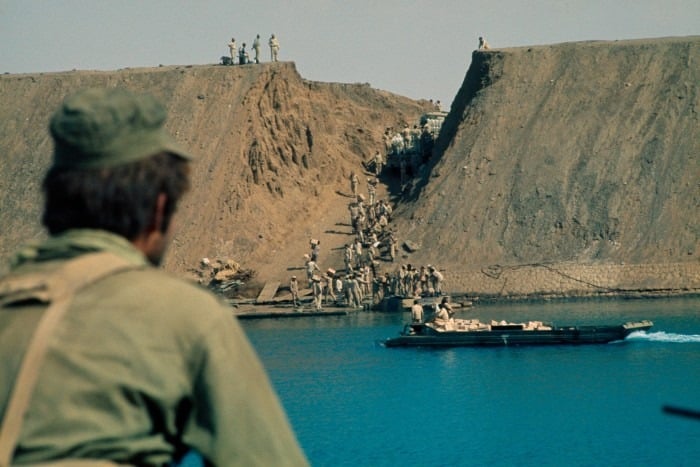An enthralling account with contemporary resonance examines how Israel regained the initiative in 1973’s Yom Kippur war
An abiding memory of October 6 1973 is of Israeli men rushing out of their synagogues on Yom Kippur, the holiest day of the Jewish year, to go to war. If Israel’s intelligence system had worked as it should, there would have been no need to dash: they would already have been mobilised, and the Egyptian and Syrian armies would either have been deterred or defeated.
This moment is now studied as one of the classics of surprise attack, not because the Arabs successfully hid their preparations for war — though they did what they could — but because those at the top of Israeli military intelligence decided to ignore warning signs that now seem so blatant. They trusted a concept that told them Syria would not go to war without Egypt, and in turn Egypt would not go to war until they could neutralise the Israeli air force, which had been used to such deadly effect against them in the six-day war of June 1967. That plan was reinforced by the arrogance that often follows regular victories and the consequential underestimation of the enemy.
Even as warning signs came in that the concept might not hold water — the Egyptians crossing the Suez Canal, the Syrians moving on to the Golan Heights, surface-to-air missiles shooting down Israeli aircraft — those responsible insisted that it did, relying on a high-level spy close to the Egyptian president Anwar Sadat, close monitoring of Arab military moves, and a confidence that they had much more defensible borders. Moreover, given the international condemnation that would inevitably result, the Israelis preferred not to start the next war and — given the financial cost — preferred not to mobilise every time the Arabs appeared to be preparing for something big.
The most compelling chapters in Eighteen Days in October, Uri Kaufman’s pacy and enthralling account of the 1973 war, are the early ones describing how Israel’s military intelligence came to hold these beliefs, and how they held on to them for so long. For a few days, until October 9, the situation appeared desperate, until after some mis-steps, scrambling and improvisation by Israeli forces, it was stabilised and the pendulum began to swing the other way.
The first priority was stopping the Syrian army, which was kilometres from Israel proper. Here the war was fought as a series of holding operations until the Syrians lost momentum and were eventually pushed back, to the point where Israel began to threaten Damascus. With Egypt, the fear was that Sadat’s forces would consolidate their position on the eastern side of the Suez Canal, and then this would be confirmed by a UN ceasefire resolution. This would not only be seen as a defeat, but would create conditions for regular skirmishes and more wars.
At first, Egypt was able to beat off some incoherent Israeli counterattacks, but then came a calamitous misjudgment by Sadat, when — against the advice of his chief of staff, General Sa’ad El Shazly — he ordered a further advance. A vast tank army moved further into the Sinai, beyond the comfort zone of the Soviet-provided air defences into a vicious Israeli ambush. Only then did Israel embark on its boldest move, finding a way to catch Egypt by surprise by getting its own forces on to the western side of the canal, which eventually cut off the Egyptian Third Army. Israel got ceasefire terms it could live with.
Much of the drama in the book comes from the combination of intense fighting and continuous squabbling among the Israeli commanders. Ariel Sharon emerges as the star of the show — egotistical and insubordinate, a personal and political rival to the Labour party establishment running the show, yet a bold and audacious commander with an intuitive grasp of warfare. He drove his superiors crazy, especially the hapless Shmuel Gonen, chief of the Southern Command — a genuine war hero but who lacked the temperament and judgment for a senior command.

Kaufman, a New York real estate developer, has put years of research into Eighteen Days in October. Its strength lies in its accounts of the key battles of the war from an Israeli perspective, and the decisions that led to them. A constant theme is the importance of time: the minutes and hours that make the difference between reinforcements arriving, positions being sacrificed, one side losing its nerve.
He does not ignore the wider international context, but here his touch is less sure. There is a lot more to be said about the diplomacy that surrounded the Yom Kippur war; I was not wholly convinced by his assessments of the factors influencing some of Sadat’s decisions, including why he launched the offensive. The fact that the country was caught by surprise damaged the reputations of Prime Minister Golda Meir and chief of the general staff David Eleazar, although both kept their nerves and got most of the key judgments right. Defence minister Moshe Dayan managed to deflect criticism, although he was anxiously ready to contemplate an early ceasefire, even drawing attention to Israel’s nuclear capabilities to deter the Arabs from pushing too hard (Meir said, “Forget about it”).
Reading this account, it is hard not to think of Ukraine — another country that finds itself dependent on American largesse at time of war without being wholly sure that the interests of its benefactor are aligned with its own. There are contemporary resonances in Israel’s urgent pleas to Henry Kissinger to authorise a massive airlift of arms.
It is also always poignant to be reminded how, in closely fought conflicts, so much can depend on moments when a battle could go either way but one side sees through the fog of war with greater clarity, and how comradeship and patriotism shape the responses of those doing the fighting. Kaufman cites a moment on the Syrian front when Avigdor Ben-Gal, commanding the 7th Israeli armoured brigade, asked an old friend, Meshualem Retes, in charge of an already battered unit, to reinforce a crucial position. Both knew this was a suicide mission. Having acknowledged that he would have refused the order from anyone else, Retes said, “I’ll do it for you”, closed his tank hatch, went into battle, and was killed by a direct hit.
Eighteen Days in October: The Yom Kippur War and How it Created the Modern Middle East by Uri Kaufman St Martin’s Press, $32, 400 pages
Sir Lawrence Freedman is emeritus professor of war studies at King’s College London and author of ‘Command: The Politics of Military Operations from Korea to Ukraine’
Source: Financial Times



